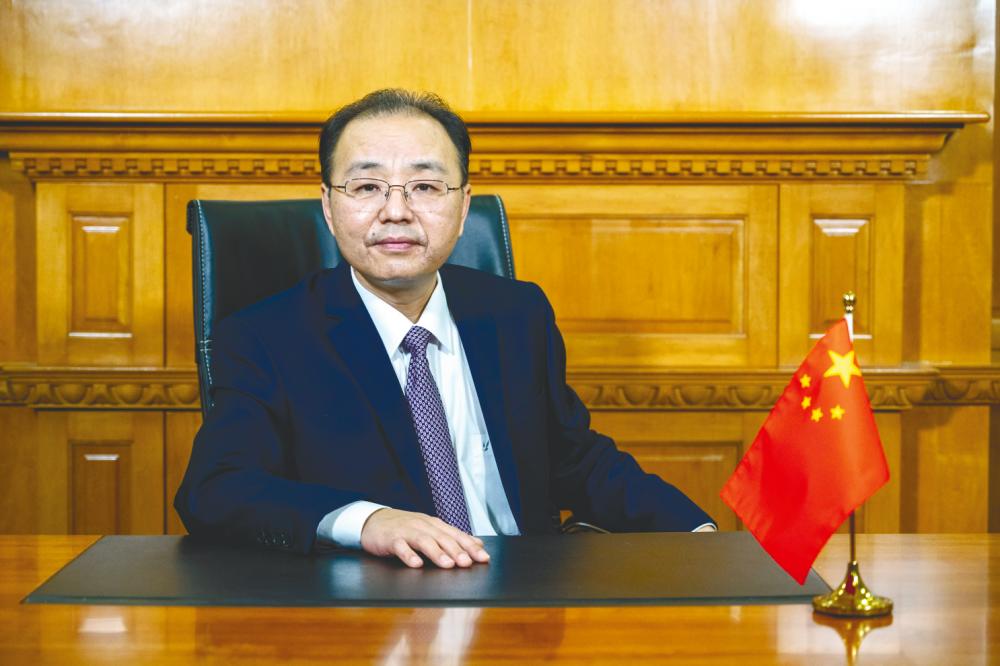PETALING JAYA: Against the backdrop of maintaining Covid-19 epidemic prevention and control measures, China stands ready to work with Malaysia to strengthen cooperation in the post-pandemic period, including promoting and advancing high-quality Belt and Road and other major projects, jointly exploring new businesses in fields including e-commerce, internet and digital economy, and continuously enhancing economic and trade relationships between the two countries.
China’s ambassador to Malaysia, Ouyang Yujing (pix), said trade between China and Malaysia grew 5.7% to US$131.16 billion (RM541.43 billion) last year, against the odds posed by the Covid-19 pandemic.
Worth noting is that China is Malaysia’s largest trading partner for 12 consecutive years, and Malaysia remains the second-largest trading partner of China among Asean countries. China’s investments in Malaysia increased by nearly US$1 billion with a growth rate of 22.6%, and China is largest foreign investment source of Malaysia’s manufacturing industry for four consecutive years.
“China and Malaysia are good neighbours with millennial friendship and good partners in Belt and Road cooperation. In the field of economy and trade, China is willing to expand the scale of trade with Malaysia, promote trade transformation and upgrading, and develop the services trade in an innovative way,” Ouyang told SunBiz.
He said China’s 14th Five-Year Plan (2021-2025) launched on March 11 prioritises the opening up of more sectors of the economy in a more thorough fashion to more countries.
By leveraging the demand of China’s super-sized domestic market, he said, China will promote international cooperation, achieving mutual benefits and win-win results, advancing high-quality Belt and Road cooperation, and advocate the building of a community with a shared future for mankind.
Following the completion of China’s domestic ratification of the Regional Comprehensive Economic Partnership (RCEP) agreement on April 15, Ouyang said, economic and trade cooperation between China and Malaysia will be even closer to achieve mutual benefits and win-win results, and make a greater contribution to the common development and prosperity of the region.
“We believe that the effective implementation of RCEP will greatly boost the confidence of all parties in economic growth, significantly enhance the regional economic integration in East Asia, and promote the integration of regional industrial, supply and value chains.”
He added that RCEP is the world’s largest free trade agreement and is of great significance to deepening regional economic integration and to stabilising the global economy.
“China will continue to encourage interested Chinese enterprises to invest in Malaysia, and vice versa. China is also willing to work with Malaysia to safeguard the multilateral trading systems with World Trade Organization at its core as well as the regional free trade agreements including RCEP, and to foster an open world economy,” Ouyang said.
The ambassador, who took office in December 2020, said China will strengthen cooperation in various areas and through various forms, to continuously enhance bilateral economic and trade cooperation with Malaysia.
“Malaysia has advantages in fields including information and communication, semiconductor packaging and testing, tropical agricultural products, and mariculture technology, (of) which China has a huge market demands. There are broad prospects for the two countries to strengthen technological and industrial cooperation in these fields. In the field of vocational education, both sides are in great need of skilled professionals, and can carry out more exchanges and cooperation in the future,“ Ouyang said.
He added that both countries will have more opportunities to share the advantages of multilateral trade, enjoy more open systems and platforms, and participate in world-class events such as the China International Import Expo.
“In the field of science and technology, China is willing to actively participate in Malaysia Digital Economy Blueprint, strengthen bilateral cooperation on the digital economy, upgrade the digitisation of trade, as well as encourage more technology-intensive enterprises to invest and operate in Malaysia.
“It is believed that in the next few years, China-Malaysia economic and trade cooperation will be even closer and achieve greater development,” Ouyang said.
He observed that China and Malaysia have enjoyed in-depth and practical cooperation in various sectors, with fruitful outcomes in areas such as economic and trade cooperation parks, manufacturing, infrastructure, communications, and digital economy.
“A large number of flagship projects, such as the ‘Two Countries, Twin Parks’ and the East Coast Rail Link, are making steady progress. I look forward to continuing to push forward all-around and in-depth development of China-Malaysia economic and trade cooperation, to bring it towards a higher level.”
Ouyang said China and Malaysia’s cooperation in culture, tourism, education, science and technology has yielded outstanding results due to geographic proximity, close cultural links and people-to-people exchanges.
On tourism, he said since 2012, China has been Malaysia’s third-largest source of tourists for eight consecutive years, behind Singapore and Indonesia, and the largest source of tourists outside of Asean.
In 2019, Malaysia was the eighth largest outbound tourist destination for Chinese citizens. About 3.11 million Chinese tourists visited Malaysia, accounting for 12% of all foreign tourists. The total consumption of Chinese tourists in Malaysia was RM15.3 billion, accounting for 17.8% of Malaysia’s foreign tourists’ consumption, second only to Singapore.
“Both sides put great importance on the development of the tourism industry. It is believed that tourism exchanges and cooperation between China and Malaysia will reach new heights after the epidemic,” Ouyang said.









